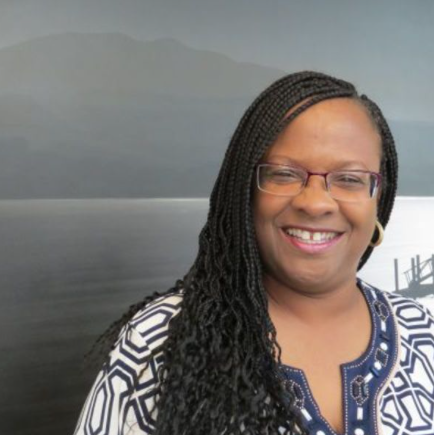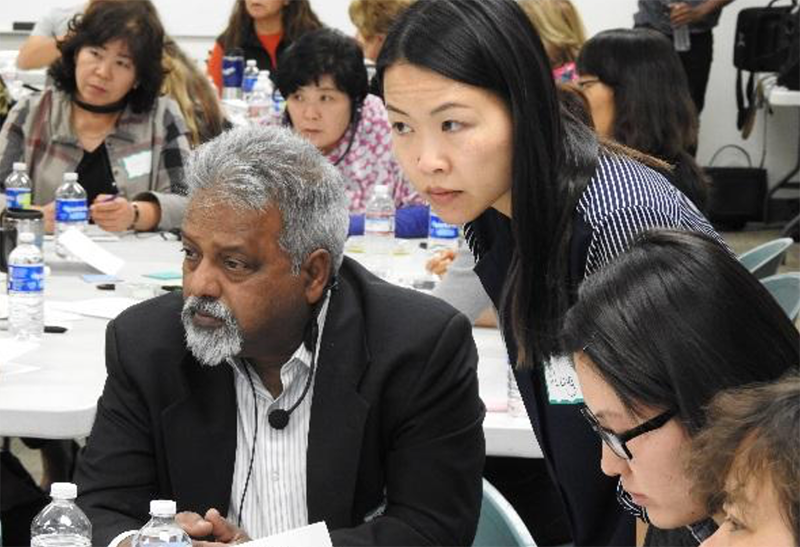I recently had the privilege of preaching a sermon at my church called, “He that hath an ear let him hear.” This title came from several scriptures in the Book of Revelation that each say, “He that hath an ear let him hear what the Spirit is saying to the churches.” As I reflected on writing this blog, I believe that there is a similar message to philanthropy, nonprofits and others that seek to help those in need that goes something like this, “We who have ears, let us hear what the people are saying to us!”
I thought about how that message applied to the fourteen Community Listening Sessions (CLS) that The James Irvine Foundation held last year across California. We listened to over 400 voices of those who are working yet still struggling to make ends meet. And in this practice of listening, we learned about the hopes and aspirations of these individuals, as well as many of the hard truths they face. (You can learn more about what we heard at Irvine.org/CAvoices.)
It’s interesting that we have so many ways that make things easy, nowadays, but we still believe things are hard. Let’s think about it. Almost all of us have cell phones that we have with us or close to us, all the time, even while sleeping. We can go on the Internet and watch live TV, read any newspaper in the world, watch our kids play soccer on live stream when we can’t be there physically, and hang out via technology in meetings from six (or more) different cities (or countries) and see each face of the person who is talking.
With of all this technology we have available to us, we hear a lot, even if we don’t want to hear. But are we listening? Have we lost the art of truly listening, because we have to work so hard to block out what we don’t want to hear?
If you need to retune your ear to truly listen and respond, I offer the following thoughts:
- Listen deep enough to be changed: Listening is active, it’s intentional, it’s the way that we connect and relate to each other, no matter our race, creed, color, gender orientation, political or socioeconomic status. When we decide to listen deep enough to be changed, we set aside pre-judgement, pre-conceived notions, and pre-planned thoughts about what to say next. When people feel like they are authentically being heard, they open up more, they trust more, they speak their truth. Their truth is a catalyst for the hearer to be changed.
- Honor the voices that you’ve heard: Honoring is holding the voices of the people in high esteem. We honor the voices by engaging in authentic conversation, by being thoughtfully curious, by opening up and sharing our stories, as well, not just our triumphs, but the things that challenged us, the hurdles that we faced and continue to face. We honor the voices by listening without trying to solve, without trying to be the hero or be the resolution to what we hear. Meeting and accepting people right where they are, honors them.
- Give the people their voices back: Whether we are listening to build relationship with a community, to conduct research, or to figure out a better way to do things, we must remember that we do not own the voices that we hear. They are on loan to us for a purpose and those who bravely offered their voices, their stories, their wisdom and their insights, have a right to get back what they’ve given. Hence, if a report is developed, share back the report. If a process is improved, share back the improvement. If a website is built, share back the website. We must be as intentional about developing and implementing strategies to close the feedback loop as we are in initially designing the process of listening. The people deserve to learn from what their collective voices have shared, even if nothing changes, so that they too can use the information to help and better inform themselves, their organizations, and their communities.
At The James Irvine Foundation, we closed the loop on our Community Listening Sessions by developing a website (Irvine.org/CAvoices) to share back what we heard. We hosted webinars to orient community advisors and partners to the website, so that they could use the learnings in their work. We also used text messaging technology and email to send website links directly to CLS participants. In addition, we developed a 4-page, PDF summary in English, Spanish, and Traditional and Simplified Chinese that could be printed and distributed to those without Internet access. These were our ways of closing the loop and intentionally listening to be changed, honoring the voices, and giving the voices back to the people.
Kelley D. Gulley is a Senior Program Officer with The James Irvine Foundation in San Francisco, California. The private foundation supports grants expanding economic and political opportunity for Californians who are working but struggling with poverty. Kelley’s work is primarily focused on career readiness and living-wage work, impact assessment and learning, as well as diversity, equity, and inclusion initiatives. She has more than 25 years of experience in community and youth development, workforce development, building capacity in the nonprofit sector, and leading initiatives that engage residents in communities of color throughout the country.
Twitter: @Kelley_D_Gulley
E-mail: [email protected]









